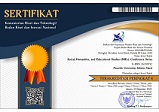21st Century Proficiency In Primary School Learning
Abstract
The development of science and technology all the time undergoes significant changes. Life in the 21st century requires a variety of proficiency that must be mastered by someone, so it is hoped that education can prepare students to master these skills in order to become successful individuals in life. 21st century proficiency contain 4 components, namely creative thinking critical thinking and problem solving, communication, and collaboration. The achievement of 21st century skills is carried out by updating the quality of learning, helping students develop participation, adjusting learning personalization, emphasizing project/problem-based learning, encouraging collaboration and communication, cultivating creativity and innovation in learning, using appropriate learning tools, designing activities learning that is relevant to the real world, and developing student-centered learning. 21st century learning in principle must be student-centered, collaborative, contextual, and integrated with society. The role of teachers in implementing 21st century learning is very important in realizing a better future for the nation's children.
Keywords
Full Text:
PDFRefbacks
- There are currently no refbacks.





